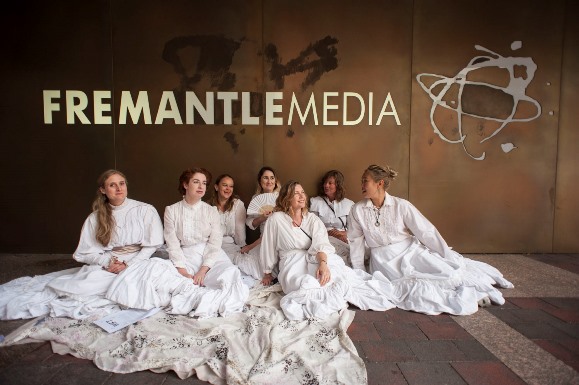Criticism over the hire of a Canadian director to shoot the Picnic at Hanging Rock mini continues to mount, with WIFT NSW and the Australian Directors Guild staging a joint protest in front of Fremantle Media’s office in Sydney today.
ADG first levelled criticisms over Fremantle’s decision to hire Canadian director Larysa Kondracki last week, with CEO Kingston Anderson stating that Australian directors were “amazed and astonished at the choice of a foreign director to work on a classic.”
Kondracki, whose credits include The Whistleblower and eps of Better Call Saul, The Americans and Rogue, will shoot half of the series alongside Aussie Michael Rymer.
The guild has disputed that Kondracki’s 420 visa met the required Net Employment Test and said it understood no female television directors currently working in Australia were approached.
Today’s protesters sat on a picnic rug in front of FremantleMedia’s office, dressed in white period dresses and playing the distinctive panpipe score from Peter Weir’s 1975 film. WIFT NSW has also released a video to outline its concerns.
Speaking to IF at the sit-in, ADG President Samantha Lang said it was continuing to investigate why a foreign director was chosen over an Australian one, and why, in light of recent gender equity initiatives like Gender Matters, that decision had been supported by Screen Australia.
“It doesn’t really make any sense to be employing a foreign director when there are many capable female directors available for the job. And in fact, there are people available for it who were not considered or approached. We would like to know why,” Lang told IF.
So far, Lang said the ADG had not received a “cogent reason’ from FremantleMedia as to why it went ahead with Kondracki’s visa application.
“We’re in the process of having meetings with them [Fremantle Media, Foxtel and Screen Australia] to ascertain why this decision was made and also to ascertain whether it’s possible to in fact replace the Canadian director within an Australian director at this stage,” she said.
“At the same time, we’re not protesting against the talent or the capacity of Larysa. It’s more to do with the fact that if an Australian director were to go to Canada and try and work on a state-funded project, we would not be allowed. So it’s not an even playing field.”
WIFT NSW president Sophie Mathisen said decisions such as this were contributing to a lack of meaningful change in the number of female directors working in the sector.
“We want a really strong commitment from Screen Australia: to ask them why and how they’re going to address this to make sure that this doesn’t happen in the future,” said Mathisen.
“We think that the easiest way is to instigate a quota immediately, because we need to make sure there are adequate opportunities for emerging and established female talent.”
“We need to shift the conversation beyond saying ‘where are female directors’?… We need employment. That’s what we need.”
Lang said it was worth looking at quotas in order to help women get credits.
“We’re half of the population. We’ve had lots of attachments, we’ve had lots of mentorships – what we want are jobs in production. That’s really important, so that’s what we’ll keep advocating for.”
The Australian Cinematographers Society has also backed the ADG in its criticism, stating it was “incredibly disappointed” that a foreign director was chosen over a local one. Actor-director Rachel Ward described the decision to the Daily Review as “a very bitter pill to swallow.”
The MEAA has also spoken out against the decision, with Equity director Zoe Angus telling IF yesterday it was “deeply concerned by the decision not to give one of our many talented local directors the opportunity to bring this iconic Australian story to life.
“We have been approached by many members expressing their dismay about this decision. Among them were some exceptionally experienced female Australian directors who would have relished the opportunity to helm this film,” said Angus.
In a statement, WIFT and the ADG have claimed that experienced Australian female directors such as Lang, Ward, Daina Reid, Emma Freeman, Ana Kokkinos, Rachel Perkins and Cate Shortland were not approached for the gig.
IF has contacted FremantleMedia for comment.



